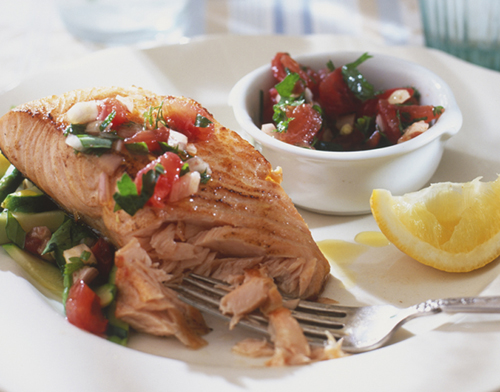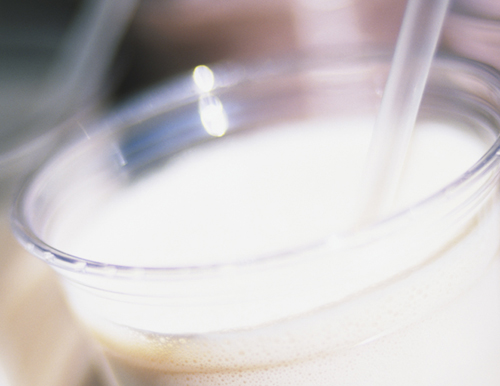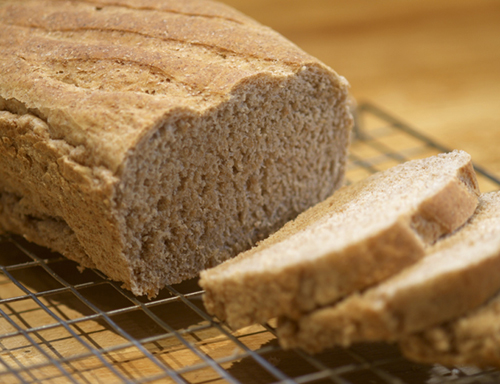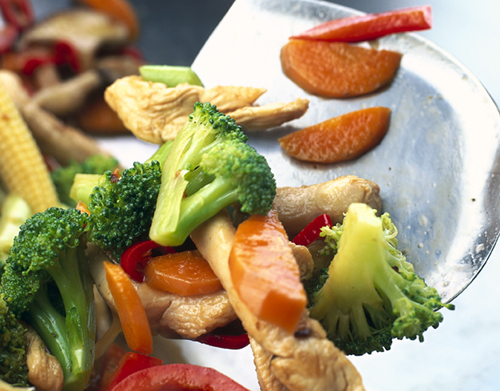A vegetarian diet
A vegetarian diet, and
vegan diets where dairy products are excluded, can be safe and healthy
during pregnancy as long as you ensure a good balance of nutrients and
sufficient protein.
Babies born to vegetarians are in a healthy weight range, although
vegans do need to be vigilant about obtaining adequate protein, as well
as reliable sources of B12 and zinc. Vegans can discuss with their
doctors whether they’ll be able to meet their vitamin B12 needs through
diet alone. Since vitamin B12 is found primarily in animal sources, a
supplement may be required. Non-animal sources of B12 may be unreliable.
A low GI diet
Glucose, the product of
carbohydrates, serves as the primary fuel for your growing baby. A new
concept in nutrition is the glycemic index (GI), which looks at how much
a food will raise the level of glucose in the bloodstream. Foods that
release glucose gradually, such as unrefined carbohydrates, and thus have a low GI, appear to be healthier.
Benefits of a low GI diet
Evidence suggests that a low
GI diet has health benefits for both the mother and baby. Maternal
carbohydrate intake can affect glucose levels in the bloodstream, which
in turn can affect the baby’s growth. Higher glucose levels, even those
in the normal range, can make for a bigger baby—above the 90th
percentile (the top end of a baby’s growth chartThere
are health risks later in life linked to a high birth weight, such as
obesity, diabetes, and heart disease. One study found that women who
consumed a low GI diet had infants that were a normal size, but had less
body fat than those from women who consumed a high GI diet.
A low GI diet can also help control glucose levels in mothers with gestational diabetes, in turn reducing complications of labor and birth associated with this condition.
Your calorie intake
During pregnancy,
most women need to increase their calorie intake by 100–300 calories a
day for proper nutrition and weight gain. Your energy needs may vary
depending on your pre-pregnancy weight and your activity levels.
Gaining the correct
amount of weight in pregnancy has benefits for both mother and baby.
You’re more likely to return to your pre-pregnancy weight if you gain
weight within the recommended guidelines. Gaining too much weight is linked with bigger babies, which carries future risks to the baby’s health (see Benefits of a low GI diet). Conversely, gaining too little weight is also not ideal for a baby’s future health.
Your recommended daily intake
Eating a healthy, balanced diet
is of paramount importance during pregnancy to help you deal with the
additional demands on your body and to provide your developing baby with
essential nutrients. By eating a wide variety of healthy foods, you
will be ensuring that you and your baby are receiving the correct
balance of nutrients. Try to include a range of foods each day from each
of the major food groups (see Your Pregnancy Diet) and eat plenty of fresh fruit and vegetables.
Include 2–3 portions each day of protein-rich foods, such as fish, lean meat, chicken, legumes, cheese, and nuts to ensure the healthy growth of body structures.

Try to include 3 servings of dairy products each day. Ideally, these should be low-fat products, such as low-fat milk and low-fat cheese and yogurts.

Have 3 servings of whole grain carbohydrates, such as brown rice and whole-wheat breads and pasta, to keep up energy levels and ensure a supply of fiber.

4–5 servings of vegetables
each day will ensure a good supply of essential vitamins and minerals.
Try to eat different colored produce and don’t overcook vegetables.

3–4 portions of fresh fruit daily will also provide a wide range of vitamins and minerals, many of which contain important protective antioxidants.

1–2 servings daily of iron-rich foods such as eggs or dark leafy green vegetables will help maintain healthy iron levels during pregnancy when demands are increased.

Your body mass index
At the start of pregnancy, your doctor may tell you your body mass index, or BMI.
This is an estimate of
your body fat based on your weight and height. By calculating your BMI,
your doctor can establish whether you are a healthy weight for your
height or whether your weight could cause problems during pregnancy.
Your BMI is
calculated by multiplying your weight in pounds by 703, dividing the
answer by your height in inches, then dividing the answer by your height
in inches again. A BMI of 18.5–24.9 is considered normal; 25–29.9 is
considered overweight; 30–39.9 is classified as obese; and over 39 is
very obese. If you have A BMI of below 18.5, you are thought to be
underweight.
Being underweight in
pregnancy can make you more likely to give birth prematurely, or have a
“small-for-dates” baby. Being overweight means that you are at a higher
risk of problems such as high blood pressure, preeclampsia, and gestational diabetes, and are more likely to have a larger baby. These factors increase the risk of complications at the time of delivery.
What to avoid
Dietary precautions
Certain foods should
be avoided or their intake limited since they may pose a risk to your
unborn baby. Simple cooking and hygiene measures are also important to
limit the risks.
Listeria is a food-borne bacteria to which pregnant women are more susceptible.
It is found in unpasteurized dairy products, as well as refrigerated,
ready-to-eat foods like meat, poultry, and seafood. To avoid it,
thoroughly reheat hot dogs, lunch meats, or prepared deli foods and
avoid unpasteurized dairy products and check soft cheeses labels to be
sure they’re made with pasteurized milk.
Nearly all seafood contains at least trace amounts of mercury which can affect the development of the fetal nervous system.
Pregnant women should avoid swordfish, shark, king mackerel, and
tilefish. To stay within safe limits, eat up to 12 ounces per week of
lower-mercury seafood like shrimp, salmon, pollock, catfish, and canned
light tuna
Toxoplasmosis is a parasite spread through cat feces or undercooked beef, pork, or lamb that can harm the fetus.
Avoid changing cat litter and practice careful hygiene in the kitchen
when preparing raw meat, being careful not to contaminate other foods
such as lettuce or vegetables. Beef, pork, and lamb all need to be well
cooked.
Salmonella bacteria are found in chicken and eggs.
Infection with salmonella can cause severe vomiting, but doesn’t
directly affect the baby. Avoid any products containing raw or
undercooked eggs, and make sure all poultry is thoroughly cooked
through, since cooking kills the bacteria.